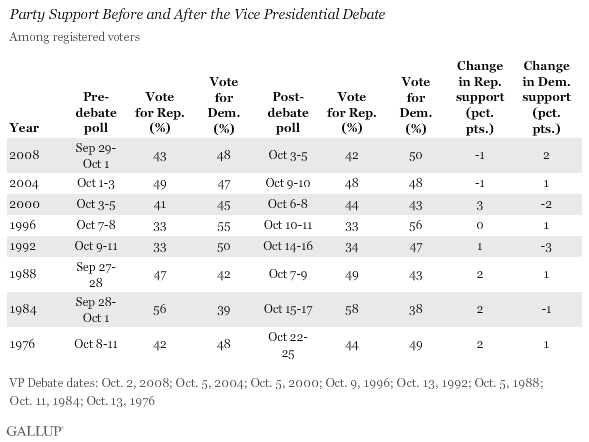WASHINGTON, D.C. -- The chances that Thursday's vice presidential debate between Joe Biden and Paul Ryan will have a major impact on the 2012 presidential race are small, according to an analysis of Gallup trends. None of the eight vice presidential debates occurring from 1976 to 2008 appears to have meaningfully altered voter preferences.

In contrast to presidential debates, Gallup has not historically asked viewers of the vice presidential debates directly about their views on who won and who lost. However, a review of voters' preferences for president before and after each debate reveals that past vice presidential showdowns have had almost no influence.
This lack of movement is clearer in election years 1992, 1996, 2000, and 2008 because Gallup conducted Daily tracking polls in those years, allowing for a more precise evaluation of any potential impact of the vice presidential debate. The median change in support after the vice presidential debates in those years was one percentage point each for the Republican and the Democratic ticket.
In 1976, 1984, and 2004, the interval between the last pre-vice presidential debate poll and the post-vice presidential debate poll included a presidential debate, which makes it impossible to isolate the effect of those years' vice presidential debates on the polls. The pre- and post-vice presidential debate poll in 1988 did not span an interval that coincided with a presidential debate; however, the length of time between polls allows for the possibility that other events played a more direct role in voter preferences.
This apparent lack of impact seemingly belies the fact that a number of the vice presidential debates produced memorable and fascinating political moments -- some of which achieved a level of fame that outlived the election. For example, in 1976, vice presidential nominee Bob Dole made controversial statements suggesting he blamed previous Democratic administrations for American lives lost in various 20th century wars, saying "I figured up the other day. If we added up the killed and wounded in the Democrat wars in this century, it would be about 1.6 million Americans, enough to fill the city of Detroit."
In 1988, after Republican nominee Dan Quayle noted that he had spent as much time in Congress as did John Kennedy when Kennedy ran for president, Democratic vice presidential nominee Lloyd Bentsen famously responded, "Senator, I served with Jack Kennedy, I knew Jack Kennedy, Jack Kennedy was a friend of mine. Senator, you are no Jack Kennedy." More recently, the 2008 vice presidential debate between Biden and Republican nominee Sarah Palin was a highly anticipated affair, at least partially due to Palin's dramatic entrance onto the political scene, coupled with her political inexperience and perceptions that she lacked knowledge on the key issues.
Implications
Notwithstanding their potential for good theater, vice presidential debates have not traditionally influenced presidential voting preferences in any meaningful way. This may be because voters are understandably more focused on the top of ticket, or because debates themselves rarely influence voters' pre-existing views. The vice presidential debate also occurs late in the campaign cycle -- as the presidential debates do, typically in late September or early October -- after many voters have firmly settled on which candidate to support.
Presidential debates have not been known to move the needle much on voter preferences either; however, the first presidential debate of this year's campaign clearly resulted in a shift toward Romney, albeit small and possibly temporary. Should either Biden or Ryan achieve as unambiguous a win in Kentucky as Romney did in Denver, the vice presidential debate this year could too be an exception.
